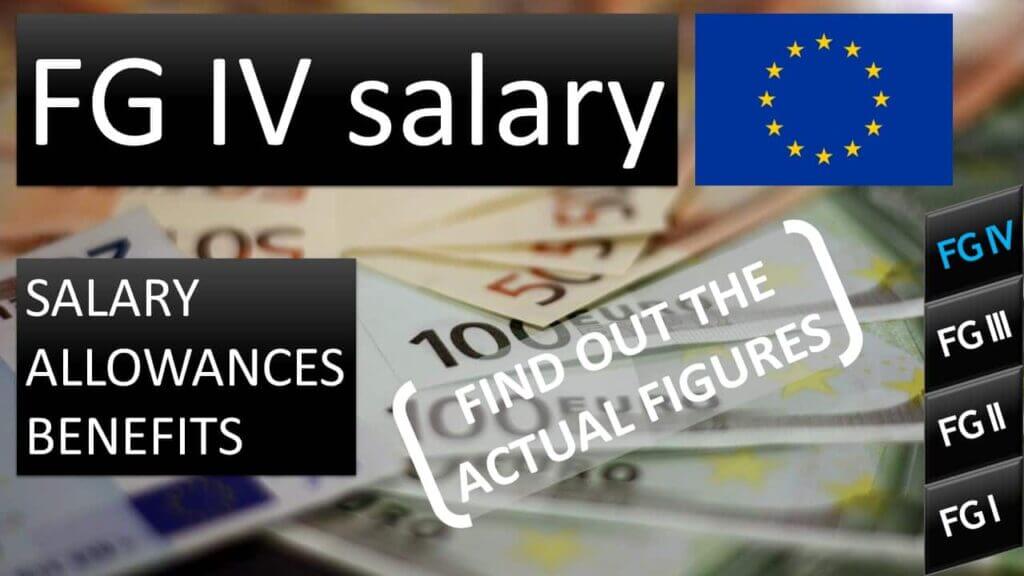Updated with figures applicable from July 2025 to June 2026
The monthly ‘basic salary’ for Contract Agents in function group III (FG III) in the European Commission ranges from EUR 3475,62 for grade 8 step I to EUR 6444,44 for grade 12 step 7. The amount of basic salary depends on which grade (8-12) and step in each grade (1-7) the staff member finds herself in.
Contract agents’ remuneration by family and residence status
Below is a sample calculation of an
FG III (grade 8 step 1) take home pay
(a typical situation for most people) with allowances for four common scenarios for a Contract Agent employed in Brussels, Belgium. If you are in a higher grade, you can do a rough estimate of your salary by adding the difference between basic pay in grade 8 and your actual grade.
| Situation 1 | Situation 2 | Situation 3 | Situation 4 |
|---|---|---|---|
| Single local with no children | Married local with 2 children | Single expat with no children | Married expat with 2 children |
| CONTRACT AGENT FG III | ||||
|---|---|---|---|---|
| Basic Pay | 3476 | 3476 | 3476 | 3476 |
| Household allowance | 0 | 298 | 0 | 298 |
| Dependent child allowance | 0 | 1012 | 0 | 1012 |
| Expatriation allowance 16% | 0 | 0 | 686 | 686 |
| Pension contribution 12.1% | -404 | -404 | -404 | -404 |
| Sickness insurance contribution | -57 | -57 | -57 | -57 |
| Accident insurance contribution | -3 | -3 | -3 | -3 |
| Tax | -0 | -28 | -0 | -28 |
| Unemployment Insurance contribution | -11 | -11 | -11 | -11 |
| Special levy (tax) 6% | 0 | 0 | 0 | 0 |
| TOTAL REMUNERATION | 3001 | 4283 | 3687 | 4969 |
N.B. Please treat the above values only as about 90% indicative, because only your EU institution can do a precise calculation based on your individual circumstances and the full set of EU rules.
On top of the above, children would either be guaranteed a place in the European School, or a single Education Allowance per child. The expat/expat family would also get an annual Travel Grant that depends on the distance between home country and place of employment.
Basic salary vs. full remuneration package
This article covers the topic of salary for Contract Agents in Function Group III (FGIII) (‘agent contractuel’ in French) in the European Commission. The information about FGIII salary also directly applies to staff of the European Parliament, European Council, EU agencies and all other EU institutions.
RELATED ARTICLES ON CONTRACT AGENT SALARIES:
* Salary of Contract Agents FGI
* Salary of Contract Agents FGII
* Salary of Contract Agents FGIV
ARTICLES ON ADMINISTRATORS AND ASSISTANTS SALARIES:
* Salary of Assistants AST4
* Salary of Administrators AD5
* Salary of Administrators AD7
When you start to work for an EU institution, you will be asked to prove your previous work experience. Depending on the length of it, you will be assigned a particular grade within function group III, which in turn will directly impact your starting basic salary. If you have up to five years of work experience, you’ll be placed in grade 8. Up to fifteen years of work experience will place you in grade 9. More than 15 years of experience will place you in grade 10. For the starting basic salary in each of grades 8, 9, 10, 11, and 12 see the table below.
| Qualifications and professional experience | Grade & step | Starting basic salary |
|---|---|---|
| less than 5 years | 8/1 | EUR 3475,62 |
| between 5 years and 15 years | 9/1 | EUR 3932,44 |
| 15 years or more | 10/1 | EUR 4449,30 |
| Attainable through reclassification or promotion | 11/1 | EUR 5034,15 |
| Attainable through reclassification or promotion | 12/1 | EUR 5695,80 |
Important to note – if you start working for an EU institution with 4,9 and 14,9 years of experience, you will not be automatically ‘reclassified’ to a higher grade once you reach the 5 or 15 years threshold.
Grades 11 and 12 can be reached in two ways. Firstly, by being employed at the same institution for a longer period through an exercise called ‘reclassification’, which in practice means automatic advancement through the European Commission salary scales by one step every two years. Secondly, you can undergo ‘promotion’ based on good professional performance. A ‘promotion’ allows you to skip several steps or even a grade at once. If you want to be promoted, be sure to not only work hard, but also make your management notice your efforts throughout the year and during the annual ‘appraisal exercise’.
Complete remuneration package
Knowing the monthly ‘basic salary’ does not tell you much about your final take-home pay and the full remuneration package. There are two reasons for this.
Firstly, the basic salary can make up anything between ~85% and 130%+ or more of your total remuneration package depending on whether you are entitled to the various allowances. This is especially so if you are an expat or/and have children.
Secondly, the country you are employed in has a significant impact on your total salary due to the European Commission ‘Correction Coefficient‘. Brussels is used as reference, so if you work for EU institutions in Belgium, you get 100% of your salary and allowances. However, if you work for an EU agency in Scandinavia, your salary and allowances will upped by 18-31% to compensate for higher living costs. Conversely, if you will work for the EU in Bulgaria, you will get only a bit more than half of what your colleague in Brussels gets.
European Commission 2025-2026 salary scale for Contract agents FGIII
| FUNCTION GROUP | GRADE | Step 1 | Step 2 | Step 3 | Step 4 | Step 5 | Step 6 | Step 7 |
|---|---|---|---|---|---|---|---|---|
| FG III | 12 | 5695,80 | 5814,24 | 5935,17 | 6058,57 | 6184,54 | 6313,16 | 6444,44 |
| FG III | 11 | 5034,15 | 5138,79 | 5245,67 | 5354,74 | 5466,11 | 5579,76 | 5695,80 |
| FG III | 10 | 4449,30 | 4541,83 | 4636,29 | 4732,72 | 4831,11 | 4931,59 | 5034,15 |
| FG III | 9 | 3932,44 | 4014,22 | 4097,70 | 4182,92 | 4269,92 | 4358,67 | 4449,30 |
| FG III | 8 | 3475,62 | 3547,90 | 3621,70 | 3696,99 | 3773,89 | 3852,34 | 3932,44 |
Complete basic salary scale for contract agents FG III. Source: Staff Regulations, Annex “Transitional provisions applicable to the staff covered by the Conditions of Employment of other Servants”, Article 93
Impact of Correction Coefficient on FGII basic pay
The below table shows you the actual Contract Agent FGII basic pay according to the location of your institution. You can read a dedicated article about the Correction Coefficient.
BY CORRECTION COEFFICIENT VALUE
| Country | Correction Coefficient | Adjusted Basic Pay for FG III grade 8 step 1 |
|---|---|---|
| Ireland | 130.7 | 4542.64 |
| Denmark | 129.8 | 4511.35 |
| Sweden | 117.7 | 4090.80 |
| France | 114.2 | 3969.16 |
| Finland | 112 | 3892.69 |
| Netherlands | 111.4 | 3871.84 |
| Austria | 105.4 | 3663.30 |
| Germany | 102.2 | 3552.08 |
| Belgium | 100 | 3475.62 |
| Luxembourg | 100 | 3475.62 |
| Estonia | 93.4 | 3246.23 |
| Spain | 92.3 | 3208.00 |
| Portugal | 92.1 | 3201.05 |
| Malta | 91.8 | 3190.62 |
| Czechia | 91.8 | 3190.62 |
| Italy | 87.6 | 3044.64 |
| Lithuania | 86.7 | 3013.36 |
| Greece | 86 | 2989.03 |
| Slovenia | 85.9 | 2985.56 |
| Slovakia | 84.2 | 2926.47 |
| Latvia | 84.1 | 2923.00 |
| Croatia | 82.3 | 2860.44 |
| Cyprus | 79.4 | 2759.64 |
| Poland | 78.8 | 2738.79 |
| Hungary | 75.5 | 2624.09 |
| Romania | 72.1 | 2505.92 |
| Bulgaria | 64.8 | 2252.20 |
Take into account that your allowances will also be adjusted by the Correction Coefficient. If you will work not in Brussels, but in another EU location, you should multiply the grand total values in the “scenarios table” to get the actual approximate figure.
ALPHABETICALLY BY COUNTRY
| Country | Correction Coefficient | Adjusted Basic Pay for FG III grade 8 step 1 |
|---|---|---|
| Austria | 105.4 | 3663.30 |
| Belgium | 100 | 3475.62 |
| Bulgaria | 64.8 | 2252.20 |
| Croatia | 82.3 | 2860.44 |
| Cyprus | 79.4 | 2759.64 |
| Czechia | 91.8 | 3190.62 |
| Denmark | 129.8 | 4511.35 |
| Estonia | 93.4 | 3246.23 |
| Finland | 112 | 3892.69 |
| France | 114.2 | 3969.16 |
| Germany | 102.2 | 3552.08 |
| Greece | 86 | 2989.03 |
| Hungary | 75.5 | 2624.09 |
| Ireland | 130.7 | 4542.64 |
| Italy | 87.6 | 3044.64 |
| Latvia | 84.1 | 2923.00 |
| Lithuania | 86.7 | 3013.36 |
| Luxembourg | 100 | 3475.62 |
| Malta | 91.8 | 3190.62 |
| Netherlands | 111.4 | 3871.84 |
| Poland | 78.8 | 2738.79 |
| Portugal | 92.1 | 3201.05 |
| Romania | 72.1 | 2505.92 |
| Slovakia | 84.2 | 2926.47 |
| Slovenia | 85.9 | 2985.56 |
| Spain | 92.3 | 3208.00 |
| Sweden | 117.7 | 4090.80 |
Function Groups and corresponding types of duties
The below table presents an overview of what kind of tasks each function group of contract agents is expected to carry out. Note the wording “under the supervision of officials or temporary staff”. In practice, the situation most often is different. Very often there is little difference between the tasks FG III and FG IV carry out, it’s a little bit of a lottery in which function group your position happens to fall. Also, once you start working in these two grades, you might soon notice that the tasks you carry out differ little from what temporary agents AD5 and AD6 perform. The main reason for this situation is the aftermath of the 2008-9 economic crisis when EU Member States exerted pressure on the European Commission to decrease costs. Someone came up with the “clever” solution to administratively “devolve” many positions and tasks from AD to CA positions, without much change to the substance of the tasks performed.
| Function group | Grades | Duties |
| IV | 13 to 18 | Administrative, advisory, linguistic and equivalent technical tasks, performed under the supervision of officials or temporary staff. |
| III | 8 to 12 | Executive tasks, drafting, accountancy and other equivalent technical tasks, performed under the supervision of officials or temporary staff. |
| II | 4 to 7 | Clerical and secretarial tasks, office management and other equivalent tasks, performed under the supervision of officials or temporary staff. |
| I | 1 to 3 | Manual and administrative support service tasks, performed under the supervision of officials or temporary staff. |
Allowances and other benefits for EU institutions staff
Several allowances and other benefits can quite significantly boost an EU official’s income. This largely depends on whether the person is an expat and has a spouse and/or children. When considering a job at an EU institution, people too often do not take these benefits into account. Important – these benefits are available to Administrators in grades AD 5-16, Assistants in grades AST 1-11, Secretaries and Clerks in grades AST/SC 1-6, and Contract Agents in grades FG I-IV.
- Travel costs on taking up duties
- Daily subsistence allowance (during probation period)
- Installation allowance and coverage of removal costs (one-time payments)
- Expatriation allowance or Foreign Residence allowance
- Household allowance
- Dependent child allowance
- European School enrollment for children or Education allowance if there is no local EU school
- Healthcare costs reimbursement to a level of 80-85% through the EU’s Joint Sickness Insurance Scheme (JSIS) for the employee and any direct family members and dependents. 100% reimbursement of costs in case of a serious illness
- Accident insurance
- Annual travel compensation
- Birth grant
- Parental leave
- Unemployment allowance
- Removal expenses when leaving your home country and again when leaving your EU institution
- EU pension, survivors and orphan’s pensions, invalidity allowance
- Lump sum payments in case of permanent invalidity or death
- Lump sum funeral expenses, up to EUR 2350
This article is based on the European Commission Staff Regulations and other publicly available information such as EU institutions’ vacancy announcements.
Do you have question or suggestion for this article? Please share in a comment below and let’s make this resource better for you and other readers!








29 responses to “Contract Agents Function Group FG III salary”
Hello,
Which one could be the best option:
An 1 year FG III contract (more than 5 years of experience) at the Commission or an interim contract equivalent to FG IV in a EU Agency?
Additional question: Is it possible to live with a FG III salary (only with expatriation allowance) in Luxembourg?
Thanks
with 20 years experience , married, one child of 10 years what salary can I receive for the first job as FGIII at the Commission?
In determining whether you fall in either Grade 8 or Grade 9, does DG HR count the years of master studies ? Since master diplomas(and an university diploma of 3 years) are not needed to join as a FG III.
Thank you for the clarification !
Hello Ben,
I tried to find out but so far no luck, so I do hope you can help me on this matter.
Hired as a FGIII grade 10, with more than 15 year of experience (18 in fact) can I start in a step 2 like in the AST positions? What is the rule or common practice to start at the maximum step (2). Many thanks in advance.
Happy New Year and thank you for the great work!
Hi! I don’t have a good reply. I hope that another reader will clarify this.
Dears,
I have 4 years of IT experience, I have only secondary school diploma and I’m participating in the cas FGIII. I’m not married but in status “Legal cohabitation” in Belgium.
I would like to know if I get extra pay for the “legal cohabitation” or if I get married?
Hi! If the “legal cohabitation” is a legally recognized status in a member state similar to marriage or civil partnership, in most cases the spouse is entitled to benefits like healhtcare coverage and you might be entitled to the household allowance. I don’t know the Belgian legal details to answer for certain about this status.
Hi and thank you for this article who helps me more understanding this system. What woud you advise to someone like me graduating this year ?
My degrees ( bachelor and Master) are related to communication , journalism design and cinematography skills . So I think what is better suited for me is something in communination .
As I did research I saw that there is only 6-10 % of people aged 35 years and bellow. Is it better for me to wait and gain some experience and come back later or to try to begin as a cast agent? (I’m currently still in my twenties).
I’m a communication intern in a company right now. And will do another internship after that. My experience will be at the end 9 months internship and 1 year of entrepreneur.
Thanks Ben,
what I meant was do you think it’s “better” to be FG III at the agency or FG IV at the Commission. I know that there are many pluses at the agency, for example possibility of permanent contract, but do you think FG IIIs from the agencies often accept offers for FG IV positions at the Commission (because the contract can only be temporary at the Commission) instead of waiting so long to get promotion? If you were to get both at the same time, what would you take into account and choose?
Thanks for your help on all the topics.
J
As for me personally, as long as both offers seem interesting, I’d almost always go for the FGIV position. FGIV has a higher likelihood of “meaningful work”, whereas in FGIII there’s a high risk of landing in a role with mostly administrative/assistant’s duties.
Also – working for COM is nominally more “prestigious”, whatever that means. 🙂
I would also not hesitate much if offered an FGIV in Brussels instead an FGIII at an agency, because 6 years (after which your contract would be terminated in COM) is quite a long time in which one should be able to find another job that lets you stay in Brussels.
And, of course, there’s the pay – FGIV are paid better + Brussels has a better correction coefficient and decent quality of life. I think that it’s hard to have a comfortable life as an FGIII, particularly, if you have a spouse who hasn’t been able to find work, and if you have to pay a large “foreigner’s premium”, for example, on rent and other services.
I’d temporarily stay in an FG III position in an agency for the following reasons:
* policy area is of high personal interest;
* there are opportunities to apply to other posts (agency is sufficiently large);
* possibility of indefinite contracts;
* practical reasons (proximity to home country).
Dear Ben,
Can you move from FG III to FG IV within an Agency?
What is your opinion on FG III at the Agencies vs FG IV at the Commission?
Julie, hi! Yes, one can be moved from FGIII to FGIV through reclassification, e.g., you impress your boss so much that you are made to “jump” a whole grade, not only a few steps. However, this is rare. Reclassifications (promotions) through grades are more often in the AD and AST positions. FGs are usually reclassified by advancing them faster through the steps where each step brings about ~150-200 EUR salary increase. See the general article on officials’ pay and the large tables.
As and FGIII, a better (safer, faster) bet is to just prove yourself and then apply to new external or internal vacancies. As a “known quantity” you are more likely to win over other job contestants.
About the second question – could you clarify a bit more for me to answer?
Hello and thank you for all your posts. They are really helpfull.
I have one question about the dependent child allowance. in case you are divorced and you pay a fixed amount for your children, are you eligible for the allowance?if yes does the eu pays directly the fixed sum( so i have read) or they attribute the whole sum of the allowance to the children?Thank you in advance.
Hi! You would have to consult a lawyer for a definitive answer. However, maybe some thoughts from me are helpful. Nominally, the allowance is paid to the parent that’s employed by an EU institution and for whom the children count as dependents. I assume that even after the divorce you are performing some kind of care duties about your children, so you should be entitled to the allowance. If you got divorced after you already got employed by an EU institution and your spouse knew about this allowance, she/he can ask the court for the allowance to be directly deposited in their bank account. However, if this was not done and you just have to pay a fixed amount monthly, you are free to decide from which “virtual pocket” it comes – from your salary, the allowances or another source. If you find out more details about this (allowance payments in case of divorced parents), please drop me a note and I’ll update the article for other readers’ benefit.
Thanks for the immediate reply…as soon as I have any insight i will let you know… Keep up the good work
Hello, thanks for the very good article. Actually the best I could find so far on the issue!
Do I understand correctly that work experience OUTSIDE the EU institutions (e.g. of more than 5 years) is recognised (and I am put in FG III, grade 9) by the EC when starting a FG III position?
Or only work experience within the EU institutions lead to a higher grade?
Thank you very much!
Hi! All work experience counts towards deciding the grade, in your case 8 or 9. However, if you miss even one months for qualification in a higher grade and start working for the EU, you will not automatically be reclassified in a higher grade once employed. If you are in this borderline situation, it pays to calculate carefully and start working for the EU a month or two later.
Is there any online calculator for contract agents?
Hi! I answered your question under the FGIV article.
Hi,
I wonder why the deductions aren’t also made on the allowances? Is that definitely the case for all, including social security and tax?
Kind regards
Hi,
Any reason why in the example the tax rate is 0.5% as opposed to 8%? Also, any reason why the solidarity of 6% is not showing?
Thank you this is a very very useful site
Hi there, may I ask what is the level of income tax to pay for grade 9 function group 3? Many thanks.
Hi! Apologies, but I’m not very competent on the tax rates and won’t be able to answer this question. Thanks for your other comments on the correct tax rates. I’ll check and try to adjust the figures to at least use a uniform tax rates. As mentioned, these calculations are only indicative, however, I agree I could do a better job re tax rates.
Hello, do you know how many years of proven experience are necessary to reach Grade 10 immediately?
Thank you!
Hi! Thanks for the question. See below. I’ve also updated the article.
You need 15 or more years to start at grade 10.
Source: Commission Decision C(2017) 6760 – employment conditions of contract staff
Thank you!
I have more or less the same question as Antonio. With 15 years work experience do I get a higher grade than 10?
If a person with 20 years of relevant experience becomes eligible for a contractual agent GF III position, can he/she start on a grade higher than grade 10?
No, Antonio. Grade 10 is maximum, to start with. The grade will increase up to 12 but only based on based on the work experience at the EU, after employment.